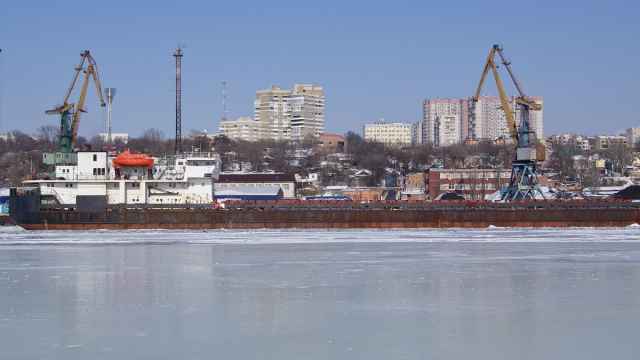The Baikal Pulp and Paper Mill will be able to dump sewage into Lake Baikal until Aug. 16, 2013, averting an imminent shutdown.
The Federal Inspection Service for Natural Resources Use on Monday signed off on an extension of the mill's license to release effluent into the lake, a spokesman for the factory said.
The news will be a blow to environmentalists who have been campaigning for the mill's closure on the grounds that its pollution kills endemic life forms and pollutes drinking water.
A spokesman for Alfa Bank, the mill's biggest creditor, welcomed the move.
"We hope that this will be the first step toward developing a set of measures that will set a course for good future development of the mill," he said. Alfa Bank is owed about 1.9 billion rubles ($60 million) by the mill, which has been put into receivership.
The previous permit to release pollutants into Lake Baikal was due to expire on Aug. 15. Release of effluent is crucial for the production of bleached cellulose, the factory's most valuable product, and managers had feared they would have to close the mill if an extension were not granted.
In early July, Alexander Ivanov, the receiver of the factory, signed an order that would have laid off the entire workforce with the exception of the chief accountant and the head of the legal department by September.
The mill's spokesman said that order may now by rescinded.
The Baikal Pulp and Paper Mill was closed in 2008 after a ban on dumping sewage into the lake. Then-Prime Minister Vladimir Putin allowed the factory to reopen with a license to dump in 2010.
The reprieve was widely expected, largely for political reasons, said one source at a large forestry company, since the mill is the main employer in Baikalsk, a town at the southern end of Lake Baikal that was founded when the mill was opened in the 1960s.
State-owned Vneshekonombank has said it is ready to refinance the debts of the bankrupt plant if the government makes a clear decision about its fate.
The bank is preparing to release its own plan for the plant on Sept. 20. Options under consideration include modernizing the plant or converting it to reprocess waste and eventually closing it down, the mill spokesman said.
The Irkutsk regional government has said it is in talks with state-owned Rostekhnologii regarding facilities to replace the factory.
The Federal Inspection Service for Natural Resources Use wants to clamp down on information about its activities following several cases of top executives offering comments to the press, Izvestia reported Wednesday.
Watchdog chief Vladimir Kirillov has ordered the creation of a new committee independent of the agency's press service that will "filter" information passed to journalists, the newspaper said.
Izvestia cited sources within the organization who said that Kirillov was unhappy that senior figures in the agency had publicly commented on speculation that a flooding disaster in the Krasnodar region last month could have been caused by the opening of a dam. Another reason was an information leak, later published by Greenpeace, that 500,000 tons of spilled oil is carried into the Arctic Ocean each year by north-flowing rivers.
A Message from The Moscow Times:
Dear readers,
We are facing unprecedented challenges. Russia's Prosecutor General's Office has designated The Moscow Times as an "undesirable" organization, criminalizing our work and putting our staff at risk of prosecution. This follows our earlier unjust labeling as a "foreign agent."
These actions are direct attempts to silence independent journalism in Russia. The authorities claim our work "discredits the decisions of the Russian leadership." We see things differently: we strive to provide accurate, unbiased reporting on Russia.
We, the journalists of The Moscow Times, refuse to be silenced. But to continue our work, we need your help.
Your support, no matter how small, makes a world of difference. If you can, please support us monthly starting from just $2. It's quick to set up, and every contribution makes a significant impact.
By supporting The Moscow Times, you're defending open, independent journalism in the face of repression. Thank you for standing with us.
Remind me later.





